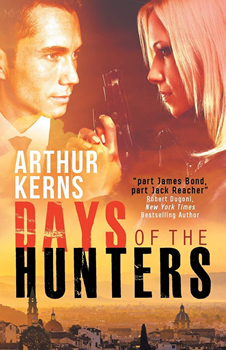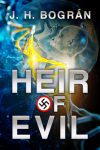May 11 – 17: “Can you identify leading trends among the books coming out this year?”
 This week we’re joined by ITW members Elena Taylor, Michael Ledwidge, J. H. Bográn and Arthur Kerns as they tackle the question: Can you identify leading trends – besides good story, thrills, and suspense – among the books coming out this year? Scroll down to the “comments” section to follow along. You won’t want to miss it!
This week we’re joined by ITW members Elena Taylor, Michael Ledwidge, J. H. Bográn and Arthur Kerns as they tackle the question: Can you identify leading trends – besides good story, thrills, and suspense – among the books coming out this year? Scroll down to the “comments” section to follow along. You won’t want to miss it!
 Elena Taylor wrote the humorous Eddie Shoes Mystery Series under the name Elena Hartwell. Now she returns to her dramatic roots—she spent over 20 years in the theater—with this darker, more psychological tale. When she’s not writing, she’s either working with writers one-on-one as a developmental editor with Allegory Editing, or spending time with her two horses at the stables or her two cats, one dog, and one husband at their home in beautiful Snoqualmie Valley, Washington.
Elena Taylor wrote the humorous Eddie Shoes Mystery Series under the name Elena Hartwell. Now she returns to her dramatic roots—she spent over 20 years in the theater—with this darker, more psychological tale. When she’s not writing, she’s either working with writers one-on-one as a developmental editor with Allegory Editing, or spending time with her two horses at the stables or her two cats, one dog, and one husband at their home in beautiful Snoqualmie Valley, Washington.
 Arthur Kerns joined the FBI with a career in counterespionage and counterterrorism. On retirement, he became a consultant with the Director of Central Intelligence and the Department of State. His lengthy assignments took him to over 65 countries. He earned degrees in International Relations from St. Joseph’s College in Philadelphia and an MBA from New York University. He spent a year studying Arabic at the Defense Language Institute in Monterey, California. A past president of the Arizona chapter of the Association of Former Intelligence Officers, he is married with two sons. His award-winning short stories have been published in a number of anthologies.
Arthur Kerns joined the FBI with a career in counterespionage and counterterrorism. On retirement, he became a consultant with the Director of Central Intelligence and the Department of State. His lengthy assignments took him to over 65 countries. He earned degrees in International Relations from St. Joseph’s College in Philadelphia and an MBA from New York University. He spent a year studying Arabic at the Defense Language Institute in Monterey, California. A past president of the Arizona chapter of the Association of Former Intelligence Officers, he is married with two sons. His award-winning short stories have been published in a number of anthologies.
 Michael Ledwidge is the author of seventeen novels, the last dozen being New York Times bestsellers co-written with James Patterson. With twenty million copies in print, their Michael Bennett series is the highest selling New York City detective series of all time. One of their novels, Zoo, became a three-season CBS television series. He lives in Connecticut.
Michael Ledwidge is the author of seventeen novels, the last dozen being New York Times bestsellers co-written with James Patterson. With twenty million copies in print, their Michael Bennett series is the highest selling New York City detective series of all time. One of their novels, Zoo, became a three-season CBS television series. He lives in Connecticut.
 J. H. Bográn is an international author of novels, short stories and scripts for television and film. He’s the son of a journalist, but ironically prefers to write fiction rather than facts. His genre of choice is thrillers, but he likes to throw in a twist of romance into the mix. He currently divides his time as resource development manager for Habitat for Humanity Honduras, teaching classes at a local university, and writing his next project. He lives in San Pedro Sula, Honduras with his wife, three sons and a “Lucky” dog. His motto is “I never tell lies, I only write them!”
J. H. Bográn is an international author of novels, short stories and scripts for television and film. He’s the son of a journalist, but ironically prefers to write fiction rather than facts. His genre of choice is thrillers, but he likes to throw in a twist of romance into the mix. He currently divides his time as resource development manager for Habitat for Humanity Honduras, teaching classes at a local university, and writing his next project. He lives in San Pedro Sula, Honduras with his wife, three sons and a “Lucky” dog. His motto is “I never tell lies, I only write them!”
- AudioFile Spotlight: March Mystery and Suspense Audiobooks - March 17, 2025
- Africa Scene: Shadow City by Natalie Conyer - March 17, 2025
- The Ballad of the Great Value Boys by Ken Harris - February 15, 2025
